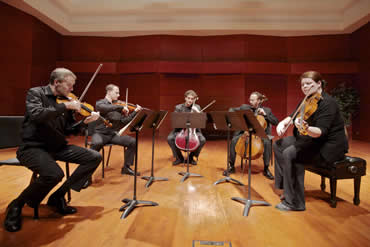May 10, 2013
Suddenly it’s exactly twenty-five years (and two days) ago. It’s May 8, 1988, and the Cary Town Band is right there on stage in Sertoma Amphitheatre. No, there’s no time warp. The band is reprising the very same program that constituted its initial offering all those years ago. The seven pieces on that initial program (and in the same original order) were supplemented by four others that the band played in other venues during its first year. Adding to the “originality” of the occasion, four of the players (Royster Chamblee, Nancy Colegrove, Bennie Fussell and Jim Hammerle) had participated in that first program.
To open the salubrious evening, conductor Stuart Holoman (’90) and the players launched into “The Bride-Elect March” by – who else? – John Philip Sousa. “The Blue Danube” of Johann Strauss, Jr. (a.k.a. Johann Strauss II) continued the traditional spirit, led by the aforementioned Jim Hammerle, founding conductor of the band. The remainder of the “big 7” included goodies such as a medley by George M. Cohan, yet another number by Sousa, and “Barnum and Bailey’s Favorite,” lacking only a steam calliope to take the sizable audience right into the middle of the circus. This Karl L. King circus piece showed the players at their most accurate.
The supplemental pieces provided possibly the purely musical highlight of the evening, everyone’s favorite “Light Cavalry Overture” by Suppé. It recalls Tennyson’s great poem, “The Charge of the Light Brigade,” mourning the tragic fate of British cavalrymen in the Crimean War. “Theirs but to do and die, / Into the valley of Death / Rode the six hundred.” Closing the program was a frisky rendition of Henry Fillmore’s “Lassus Trombone.” You’d never guess what instruments came on strong there.
May 11, 2013
After blustering and fulminating for a time, the rain gods held their peace and even poured out a blessing upon Koka Booth Amphitheatre. There on a balmy evening the Concert Singers of Cary and the Raleigh Symphony Orchestra produced the concert version of George Gershwin’s outrageous musical, Strike Up the Band. This 1920s satirical comedy constituted a polemic of sorts against what the composer, his brother Ira and the writer Morrie Ryskind saw as the excesses of the era.
Conductor Jim Waddelow brought on the Raleigh Symphony Orchestra, honored guests of the evening, to do a masterly turn on the instrumental aspects. Waddelow maintained an amazingly taut rein on the huge combined forces of players and singers, as Artistic Director Lawrence Speakman of the Concert Singers lent his talents to the bass section of the chorus.
The cast comprised no fewer than ten fine singers, any one of whom could rightly be cited for performing marvelously under such less-than-ideal (concert) conditions: Simon Bate, Brent Blakesly, Jessika Brust, Spicer Warner Carr, Carly Prentis Jones, Peter LeBeau, Jennifer Myers, Chris Salina, John Skinner, and Mark Taranto. A few perhaps should be singled out for special mention.
Peter LeBeau was a believable Horace J. Fletcher, industrial magnate and cheese producer to the world. He was properly paternalistic and arrogant, his character able to inveigle the United States into going to war with Switzerland! Had the play been staged, one could visualize him stuffed with plenty of bombast so as to appear all the more impressive and intimidating to anyone who might think of crossing him.
Jessika Brust as the lovely daughter of Fletcher, and John Skinner as the properly reserved reporter Jim Townsend created the main love interest. Their treatment of “The Man I Love” was a high vocal point of the program. Brent Blakesly’s Colonel Holmes was the president’s advisor and the “Unofficial Spokesman” of the USA. His tenor was crisp and clear, exhibiting exemplary enunciation – no super-titles needed here.
It would be hard to over-praise the work of the chorus/orchestra combination on this ambitious production. Their synchronism with the singers and each other was a thing of wonder, capturing that farcical spirit in the best Gilbert and Sullivan tradition.











